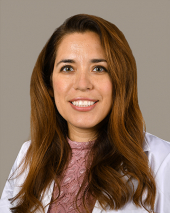Cancer — such a small word can elicit overwhelming feelings. After receiving a diagnosis, it can be hard to process what is happening and how your life is about to change. Throughout this journey, being open and communicative with your doctor, close friends and family, and yourself is a critical step in acceptance and understanding.
Talking with your doctor
Although talking with your doctor about cancer seems like a relatively straightforward conversation, it can be challenging to know where to begin. Rosa A. Guerra, MD, gynecologic oncologist with UT Physicians, outlines the four major topics to discuss:

- Treatment options, including clinical trials
- Symptoms and signs to look for after treatment is completed
- Talking to family and friends about the diagnosis
- Working on advance directives, such as outlining your wishes regarding treatment
Guerra suggests bringing someone with you to your appointments who can help write notes or advocate for your care.
“Having cancer isn’t a death sentence, but we understand how scary or overwhelming it may be to talk about it,” said Guerra, assistant professor in the Department of Obstetrics, Gynecology and Reproductive Sciences at McGovern Medical School at UTHealth Houston. “As oncologists, we’re here to help and provide guidance with other support services available to our patients.”
Sharing the news with family and friends
Revealing your cancer diagnosis to your family and friends can help increase social support, which is extremely necessary during your journey. However, at first, it may be best to just share the news with those closest to you.
“When someone is recently diagnosed, they deserve to have a safe and supportive place to express their own emotions and reactions about the diagnosis,” explained Jennifer B. Hughes, PhD, psychologist with UT Physicians. “Although, if their gut tells them to share with someone, I recommend that’s what they do.”
Following the conversation, your loved one may want to know what they can do to help. If you’re open to it, you can provide specific examples of what would be beneficial at the time — it can be emotional, informational, esteem, social, or tangible support. If help is not needed, or you’re not ready for it at the time, you can decline and offer to follow back up with them as things change.
Being honest with yourself
Having an honest conversation with yourself about your diagnosis may seem silly. Still, it can help with finding peace during this challenging time. Journaling can be a productive way to process thoughts and reactions privately.

“Writing about the fears and hopes one has for the process can help to create a greater sense of understanding,” said Hughes, assistant professor in the Louis A. Faillace, MD, Department of Psychiatry and Behavioral Sciences at McGovern Medical School at UTHealth Houston.
In addition to your own support system with family and friends, the psychologist shares that it can also be helpful to connect with other cancer survivors, join a social group with other people who have a similar diagnosis, and start meeting with a therapist.
“Your battle with cancer does not have to be done in isolation,” she said. “Everyone deserves support.”
To schedule an appointment with one of our mental health experts, call 888-488-3627.



